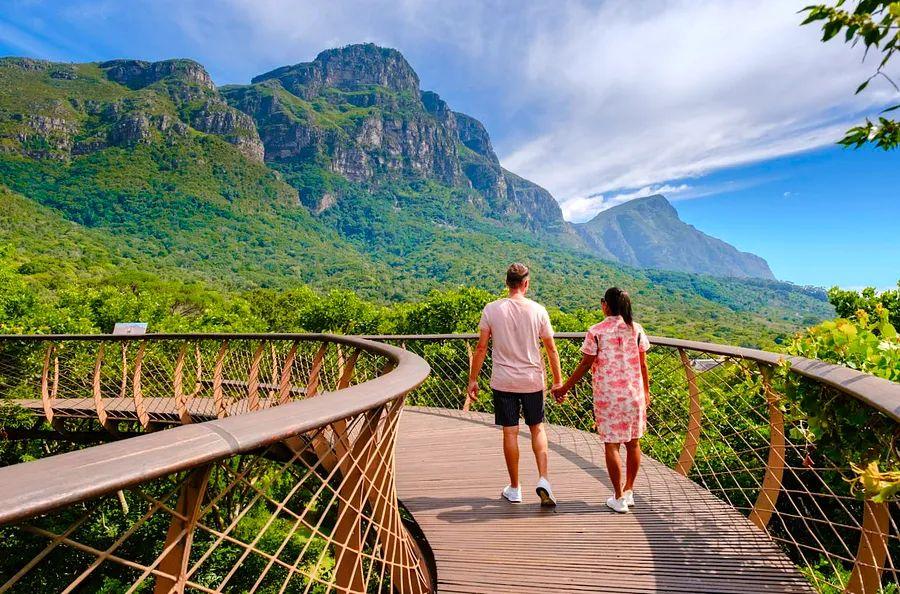Key insights to consider before visiting South Africa

Let’s get straight to the point: South Africa carries a somewhat intimidating reputation. While much is said about the country's high crime rates, there is so much more to discover that showcases its incredible diversity. Don’t let concerns about safety deter you from exploring this amazing African destination.
Vast and varied, South Africa continually surprises travelers with its offerings – from world-class surf spots and eclectic local cuisine to breathtaking mountains, vibrant cities, quaint towns, stunning desert landscapes, and abundant wildlife to observe.
The country's remarkable diversity is both its greatest appeal and its most significant challenge when it comes to trip planning. Extensive research is necessary to determine where to go, what to do, and how long to stay. Spending less than two weeks is not ideal – three weeks or more is preferable if your schedule allows.
Here’s what you need to know for a successful trip to South Africa, including tips for planning, as well as information on health, safety, and local customs.
 Families visiting South Africa should ensure they have the correct documentation. Getty Images
Families visiting South Africa should ensure they have the correct documentation. Getty Images1. Have the necessary documents when traveling with children
If you're entering or exiting South Africa with a child under 18, make sure to pack some essential documents. To combat child trafficking, all minors must possess an 'unabridged' birth certificate, which includes both parents’ names. If only one parent is accompanying the child, an affidavit from the absent parent granting consent for travel is required. While regulations can change and documents may not always be checked, it’s advisable to keep these papers handy just in case.
2. Bring cash, but not excessively
Although credit and debit cards are commonly accepted, some places in South Africa only accept cash. It's wise to keep a small reserve of notes and coins for purchases at local shops, market stalls, and for tips that you’ll need to provide throughout the day (more on tipping below).
Naturally, carrying large amounts of cash isn’t advisable, so store the majority of your money in the hotel safe or withdraw small sums from ATMs as needed. Be cautious about using street ATMs; theft and card scams are prevalent, so it’s safer to use machines located inside malls or banks.
3. Purchase a South African SIM card and utilize local Wi-Fi
Public Wi-Fi is relatively easy to access in larger cities and popular tourist spots, but if you plan to venture away from these areas, it’s beneficial to buy a South African SIM card upon arrival at the airport. The card is quite affordable, but like many things in South Africa, it requires some paperwork. You’ll need to “RICA” your SIM card, a straightforward registration process that involves providing a photo ID and proof of your address in South Africa (a simple booking confirmation works).
 To explore more of the country, consider booking a car with one of the leading rental companies. Ilyas Kalimullin/Shutterstock
To explore more of the country, consider booking a car with one of the leading rental companies. Ilyas Kalimullin/Shutterstock4. Renting a car is essential for truly experiencing South Africa
There’s no denying it – public transportation in South Africa can be quite lacking. While long-distance buses are available, they often skip smaller towns, and fares can be high for shorter trips. Long-distance trains tend to be unreliable, and hitchhiking is definitely not advisable. If you want to fully experience the country, renting a car is the way to go. Thankfully, South Africa offers a variety of fantastic road trips, and all major car rental companies operate here – just remember to book in advance, especially during the busy season from November to March.
5. Exercise extra caution when driving in urban areas
When I first relocated to South Africa, the warnings about carjackers made me expect to see masked individuals lurking at every stoplight, ready to steal my car. I distinctly remember feeling anxious at the gas station, having to roll down my window to pay, and nervously passing my cash through a narrow gap before driving off, completely stressed out and sweating.
Nowadays, I often drive with the windows down, but I approach 'robots' (the local term for traffic lights) with caution, always leaving a gap of a car length in front of me in case I need to make a quick getaway. Drive carefully, but don’t let fear take over. Keep your doors locked and stay alert, especially when driving at night; keep your windows up and your senses sharp.
6. Take local advice seriously (but expect a bit of embellishment)
Local insights are crucial, especially in countries with reputations for crime and social issues. In South Africa, your accommodation host can provide valuable information about the best bars, restaurants, transportation tips, and areas to steer clear of.
Just remember, there are many fantastic attractions located in areas that locals, particularly older ones, might avoid. Once, while staying at a guesthouse in suburban Durban, I asked the owner about places to skip, and she suggested avoiding the CBD (city center), which would have severely limited my sightseeing options. South Africans often exaggerate the dangers of crime; it's almost ingrained in their national conversation. You might need to do some additional research to separate genuine warnings from the common scaremongering.
 Be ready to tip at restaurants, gas stations, and even parking areas. Shutterstock
Be ready to tip at restaurants, gas stations, and even parking areas. Shutterstock7. Get ready to tip
Tipping is an essential part of South African culture. In many customer service roles, wages are low, and tips constitute a significant portion of income. In restaurants, a standard tip is around 10%, but 12–15% will really brighten up your server's day. When at the gas station, remember that drivers don't pump their own gas; it's customary to give the attendant at least R5, or R10–20 if they also check your tires, oil, or water.
Then there are the informal parking attendants in South Africa. While larger cities have pay-as-you-go parking, in many areas, you can park on the street for free... sort of. Car guards are everywhere, offering to watch your vehicle while you’re away, with varying levels of helpfulness.
Some will go out of their way, stopping traffic to assist you in backing out onto busy streets. Others might approach as you grab your keys, claiming they've been keeping a watchful eye on your car while you shopped. Tip these car guards based on their service—R5 is the standard acknowledgment, but R10 is more fitting for those who offer significant help.
8. South African English can take some getting accustomed to
With 11 official languages in South Africa, you’re likely to find someone who speaks English unless you venture into a very remote area. However, some local phrases might catch you off guard. A word that often confuses newcomers is “shame.” It’s incredibly versatile: a cute child dozing in the car? Shame. A family member has passed away? Shame. A hectic workweek preventing you from joining Friday drinks? Shame. It’s commonly used with 'ag' at the beginning and 'man' at the end, so 'Ag, shame man' can convey anything from sympathy to dismay.
Another frequently heard term is “hectic.” While it can refer to a busy intersection, it’s also used to describe an impressively tall building, an exceptionally long bank line, a wildly windy day, or even a notably large baby being born. In South Africa, “hectic” doesn’t strictly mean busy—it’s often an expression of amazement, akin to saying 'wow.'
 In many areas of South Africa, the bright lights don’t shine all day. Zach Louw/Getty Images
In many areas of South Africa, the bright lights don’t shine all day. Zach Louw/Getty Images9. Be prepared for plenty of discussions about politics and power outages
While some topics may be taboo in other nations, politics is fair game in South Africa. Everyone seems to have an opinion on the government’s latest actions, whether it's about the numerous potholes, recent corruption scandals, or, more commonly, the government's inability to deliver consistent electricity. You’ll soon become acquainted with the local term 'load-shedding.'
Essentially, load-shedding refers to a continual series of scheduled power outages aimed at alleviating stress on the struggling electricity grid. Areas are divided into zones, and depending on the severity, you could find yourself without power for anywhere from two to twelve hours a day. There are eight levels of load-shedding, each broken into two-hour intervals. Larger hotels are usually spared thanks to backup generators, but if you're staying in a guesthouse, hostel, or private residence, expect to experience load-shedding during your visit.
Many establishments are equipped with safety measures like emergency lighting, backup power for refrigerators and Wi-Fi, and sometimes even large generators to support the entire property. Your host will likely keep you informed about power outages, or you can use the helpful app EskomSePush, which provides details and timely notifications.
10. Using the emergency lane while driving is common practice
While the basics of greetings, dining etiquette, and everyday manners in South Africa may feel familiar, the local driving habits can be quite a shock for newcomers. One of the most distinctive practices on the road is known as 'yellow line driving'—many roads are single-lane highways, and resourceful drivers often utilize the emergency lane (or hard shoulder) as a secondary lane.
When you're on the highway and a driver behind you signals their desire to overtake, you're expected to temporarily shift across the yellow line into the emergency lane to allow them to pass. If you don’t, you might experience another common local driving behavior: tailgating. Typically, drivers will flash their hazard lights in appreciation as they go by. However, be mindful that the hard shoulder isn’t just for passing cars; always check for good visibility before pulling over, as you might encounter a group of baboons, a wandering cow, or a gaggle of schoolchildren on their way home just around the bend.

1

2

3

4

5
Evaluation :
5/5